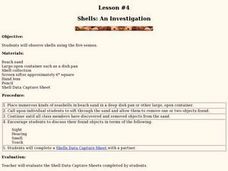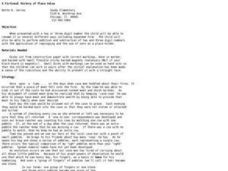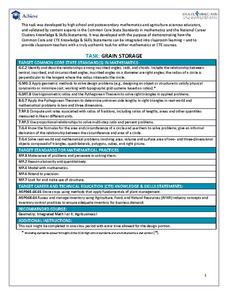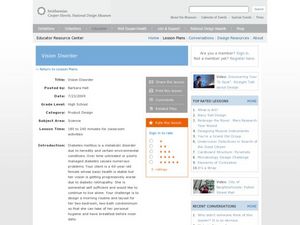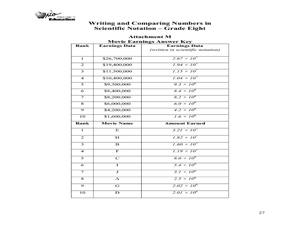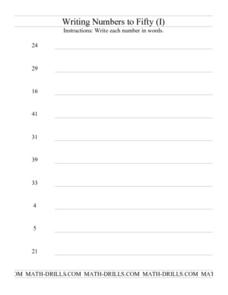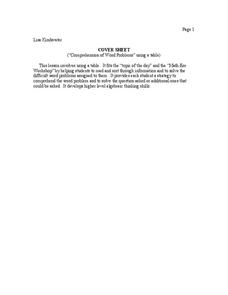Kenan Fellows
Evaluating Sensors and the Impacts of Physiological Stress: Designing a Wearable Device for Rescue Workers
A long-term project has scholars consider ways in which sensors help monitor physiological stress levels of rescue workers. They design and create a portable device for this purpose. Techies to the rescue!
Curated OER
Shells: An Investigation
Learners observe shells using their five senses. In this scientific inquiry lesson, students examine shells using a hand lens and their five senses. Learners complete an included shell data sheet.
Curated OER
How Many Ones Are There?
In this how many ones are there? learning exercise, students type in the answer to the question "how many ones are there in 22?" with immediate feedback.
Curated OER
A Fictional History of Place Value
Your class can explore standard and expanded notation, as well as computation with regrouping. They listen to a make-believe story about cavemen and the origin of numerals and place value. Then apply what they learned about renaming and...
Curated OER
Task: Grain Storage
Farming is full of mathematics, and it provides numerous real-world examples for young mathematicians to study. Here, we look at a cylinder-shaped storage silo that has one flat side. Given certain dimensions, students need to determine...
Curated OER
Vision Disorder
Students design a morning routine for a 60 year old female senior with vision disorder. In this biology lesson plan, students collaborate with their team to come up with possible solutions. They present at least two ideas of their design...
Curated OER
Comparing Fractions
Young mathematicians compare two fractions with like denominators and then move to the next level to compare fractions with unlike denominators. They will first try to use mental math to make educated guesses. There are a few guidelines...
Curated OER
The Greedy Dog
Teach young mathematicians the concepts of greater than, less than, and equal to with kinesthetic, visual, verbal, and numeric approaches. In a playful session that addresses multiple intelligences, your class will: dramatize a greedy...
Ohio Department of Education
Writing and Comparing Numbers in Scientific Notation-Grade Eight
Explore scientific notation in this mathematics lesson plan. Young mathematicians explore multiple representations of large number in scientific notation through the use of models, visual representation and expanded form. The lesson plan...
T. Smith Publishing
Counting Tools
As the title states, the activity required to complete this worksheet is counting tools! Saws, screwdrivers, and wrenches are depicted for children to count. They simply write the number of items on a line to the right of each group....
Curated OER
Numbers and Operations
Students practice using proportions to discover the fraction needed to use the right amount of an ingredient. They calculate the number of ounces in one gallon as well. They answer questions to complete the lesson plan.
Centre for Education in Mathematics and Computing
Roots and the Pythagorean Theorem
In this roots and the Pythagorean Theorem worksheet, learners solve 15 different types of problems related to square roots and applying the Pythagorean Theorem. They first determine the square root of each number and then, the cube root....
Curated OER
Writing Numbers to Fifty, I
In this math worksheet, students write ten numerals in word format. Nine of the numerals are two digit numerals. The numeral 5 is the only single digit.
Curated OER
3rd Grade Math Review
In this math review worksheet, 3rd graders respond to 14 questions that serve as a review of measurement, patterns, number sense, properties, story problems, and computation.
Curated OER
Multiplication and Division by 10, 100, and 1000
Fourth graders play the game Powerama 4, they multiply and divide whole numbers by 10, 100, and 1000. They go to the Mathfrog website and select the game. Students input an answer and then select the Check Answer button. If they made...
Curated OER
"Comprehension of Word Problems" Using a Table
Sixth graders practice solving math problems by utilizing a data table. In this number sense activity, 6th graders create a table using the numerical information about a fictitious farm's inventory. Students complete the empty segments...
Rational Number Project
Initial Fraction Ideas Lesson 18: Overview
Develop young mathematicians' ability to compare fractions with investigation into the number 1/2. After brainstorming a list of fractions equivalent to 1/2, children identify a pattern in the numerators and...
Calvin Crest Outdoor School
Survival
Equip young campers with important survival knowledge with a set of engaging lessons. Teammates work together to complete three outdoor activities, which include building a shelter, starting a campfire, and finding directions in the...
American Statistical Association
Bubble Trouble!
Which fluids make the best bubbles? Pupils experiment with multiple fluids to determine which allows for the largest bubbles before popping. They gather data, analyze it in multiple ways, and answer analysis questions proving they...
Teach Engineering
Air Pollution in the Pacific Northwest
Scholars investigate levels of nitrogen dioxide in the Pacific Northwest by examining the role of nitrogen in air pollution and how remote sensing can be used to measure nitrogen levels. An Excel spreadsheet calculates the difference...
Inside Mathematics
Magic Squares
Prompt scholars to complete a magic square using only variables. Then they can attempt to solve a numerical magic square using algebra.
Noyce Foundation
Ducklings
The class gets their mean and median all in a row with an assessment task that uses a population of ducklings to work with data displays and measures of central tendency. Pupils create a frequency chart and calculate the mean and median....
California Education Partners
Science Fair Project
Plant the data firmly on the graph. Given information about the growth rate of plants, pupils determine the heights at specific times and graph the data. Using the information, scholars determine whether a statement is true and support...
Inside Mathematics
Quadratic (2009)
Functions require an input in order to get an output, which explains why the answer always has at least two parts. After only three multi-part questions, the teacher can analyze pupils' strengths and weaknesses when it comes to...

